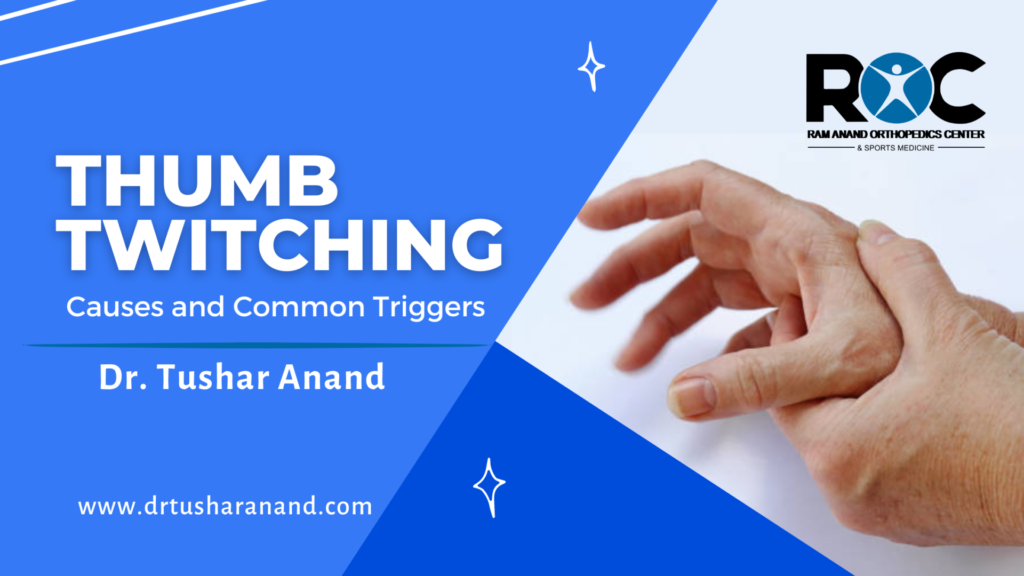Thumb Twitching: Causes and Common Triggers
Have you ever experienced a sudden, involuntary twitch in your thumb? Thumb twitching can be an annoying and sometimes concerning symptom, but it’s generally harmless. Understanding the causes and common triggers of thumb twitching can help ease your mind and possibly prevent future occurrences.
What is Thumb Twitching?
It refers to the involuntary contractions of the muscles in your thumb. These contractions are also known as fasciculations and can feel like a flutter or a brief spasm. While thumb twitching is often temporary and benign, it can sometimes be a sign of an underlying condition.
Common Causes of Thumb Twitching
Several factors can contribute to thumb twitching, ranging from lifestyle choices to medical conditions. Here are some of the most common causes:
1. Muscle Fatigue
Overusing your thumb muscles can lead to fatigue, which may result in twitching. Activities that require repetitive thumb movements, such as texting, typing, or playing video games, can strain the muscles and cause them to twitch.
2. Stress and Anxiety
Stress and anxiety can manifest in various physical symptoms, including thumb twitching. When you’re stressed, your body’s adrenaline levels increase, leading to muscle tension and involuntary muscle contractions.
3. Caffeine Intake
Consuming too much caffeine can stimulate your nervous system and lead to muscle twitches, including in the thumb. If you notice that your thumb twitches more after drinking coffee or energy drinks, it might be a good idea to cut back.
4. Nutritional Deficiencies
Deficiencies in certain vitamins and minerals, particularly magnesium, calcium, and potassium, can cause muscle twitches. Ensuring a balanced diet rich in these nutrients can help prevent twitching.
5. Medications
Certain medications, especially those that affect the nervous system, can cause side effects such as muscle twitching. If you suspect your medication is causing your thumb to twitch, consult with your doctor.
6. Nerve Compression
Conditions that compress or irritate the nerves in your hand, such as carpal tunnel syndrome, can lead to thumb twitching. This is often accompanied by other symptoms like numbness, tingling, or pain in the hand and fingers.
Medical Conditions Linked to Thumb Twitching
While thumb twitching is usually benign, it can occasionally be linked to more serious medical conditions. Some of these include:
1. Benign Fasciculation Syndrome (BFS)
BFS is a condition characterized by frequent muscle twitches that are not linked to any serious neurological disorders. Individuals with BFS may experience twitching in various parts of their body, including the thumb.
2. Motor Neuron Disease
Motor neuron diseases, such as amyotrophic lateral sclerosis (ALS), can cause muscle twitching. However, this is usually accompanied by other symptoms like muscle weakness and wasting.
3. Multiple Sclerosis (MS)
MS is an autoimmune disease that affects the central nervous system. Muscle twitching, including thumb twitching, can be one of the many symptoms of MS.
Preventing Thumb Twitching
Preventing thumb twitching often involves addressing its common triggers. Here are some tips to help reduce the likelihood of twitching:
- Take Breaks: If you engage in activities that require repetitive thumb movements, make sure to take regular breaks to rest your muscles.
- Manage Stress: Practice stress-reducing techniques such as deep breathing, meditation, or yoga to help keep your muscles relaxed.
- Limit Caffeine: Monitor your caffeine intake and reduce it if you notice a correlation between caffeine consumption and twitching.
- Eat a Balanced Diet: Ensure your diet includes plenty of magnesium, calcium, and potassium to support muscle health.
- Stay Hydrated: Dehydration can also contribute to muscle twitches, so make sure you drink enough water throughout the day.
When to See a Doctor
While thumb twitching is often harmless, you should seek medical advice if you experience any of the following:
- Persistent or worsening twitching
- Twitching accompanied by muscle weakness or atrophy
- Other symptoms such as numbness, pain, or coordination problems
If you’re concerned about twitching, consulting with a healthcare professional can provide peace of mind and help rule out any serious conditions.
For residents in Meerut experiencing persistent thumb twitching or other orthopedic issues, consider visiting an Orthopedic Doctor in Meerut. A specialist can provide a thorough evaluation and personalized treatment plan to address your concerns.
Conclusion
It can be an unsettling experience, but it’s usually nothing to worry about. By understanding the common causes and triggers, you can take steps to minimize its occurrence. If you have any doubts or persistent symptoms, don’t hesitate to seek professional medical advice.
FAQs
Thumb twitching is usually benign and often caused by factors like muscle fatigue, stress, or caffeine intake. However, if the twitching persists, worsens, or is accompanied by other symptoms such as muscle weakness or numbness, it could be a sign of a more serious condition like carpal tunnel syndrome or a neurological disorder. It’s best to consult a healthcare professional for a thorough evaluation if you have any concerns.
To stop thumb twitching, consider the following tips:
- Take regular breaks from activities that strain your thumb muscles, such as typing or texting.
- Reduce stress through relaxation techniques like deep breathing, meditation, or yoga.
- Cut back on caffeine, as excessive intake can stimulate muscle twitches.
- Ensure your diet includes enough magnesium, calcium, and potassium to support muscle health.
- Stay hydrated by drinking plenty of water throughout the day.
If these measures do not help or if the twitching persists, seek medical advice.
Caffeine is a known stimulant that can cause muscle twitches, including in the thumb. If you notice that your thumb twitches after consuming coffee or other caffeinated beverages, it’s likely due to the stimulant effect of caffeine. Reducing your caffeine intake can help alleviate the twitching. However, if the twitching continues even after cutting back on caffeine or if you experience other symptoms, consult a healthcare professional for further evaluation.

